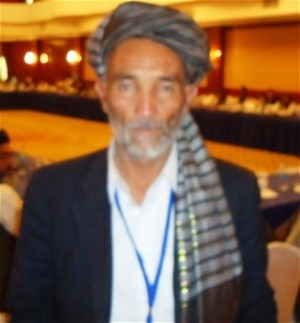
With roads too dangerous to drive, an elder travels by foot to strengthen traditional conflict resolution practices
"Even if I had to walk, I am very happy that I achieved my goal to participate in the elders' meeting in Kabul in order to bring peace to my province."-Khodai Nazar, an elder from Uruzgan Province.
5 NOVEMBER 2010 | KABUL, AFGHANISTAN
Khodai Nazar received a call one morning from the district governor of his district of Uruzgan Province. The governor reported that Nazar was invited to a meeting of elders the next day in Kabul and encouraged him to take advantage of the opportunity.
“I wasn’t able to decide what to do,” said Nazar, an elder from a remote Uruzgan village. “I wanted to participate. I knew the meeting could help solve our village problems.”
However, transportation to attend the meeting was Nazar’s first problem. He could fly to Kabul from Urzugan’s capital of Tirin Kot, but roads to get to the airport from his village were under Taliban control and too dangerous to drive.
Other Uruzgan elders encouraged Nazar to find a way to Kabul. The meeting was the first-ever gathering of southern region elders, with more than 100 elders from Kandahar, Hilmand, Uruzgan, and Zabul provinces invited. Organized by the USAID-funded Rule of Law Stabilization Program – Informal Component (RLS-I), the three-day meeting was designed to strengthen traditional dispute resolution and links between the traditional and state justice sectors.
Nazar started walking that afternoon over mountains and through fields, avoiding dangerous roads. More than seven hours later, it grew cold and darkness fell. He decided to risk hiring a car to drive through the night to Kabul.
Nazar arrived in Kabul on time the next morning for the landmark meeting. He met elders from throughout the southern region, joining discussion groups addressing issues elders resolve in their villages every day – inheritance, family, and neighbor disputes, and conflicts about land and water. He talked with elders about how their roles could be strengthened, and how elders could develop links to the state justice sector. The opportunity to connect with other elders strengthened Nazar’s resolve to contribute to building a fair, peaceful justice system in his region of Afghanistan.
“As I was walking, I was thinking that I am working not only for my village and Uruzgan, but also for Hilmand, Kandahar, and Zabul provinces. This is a very positive step for our country,” Nazar happily explained.







Comment
Make a general inquiry or suggest an improvement.